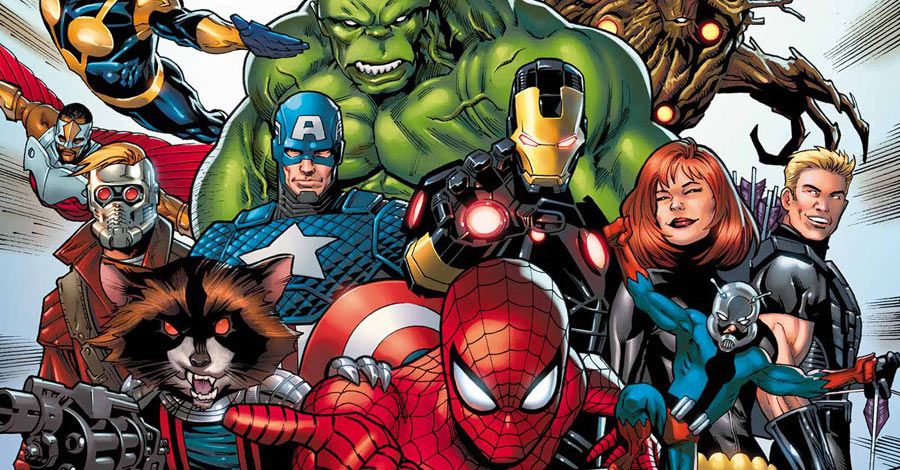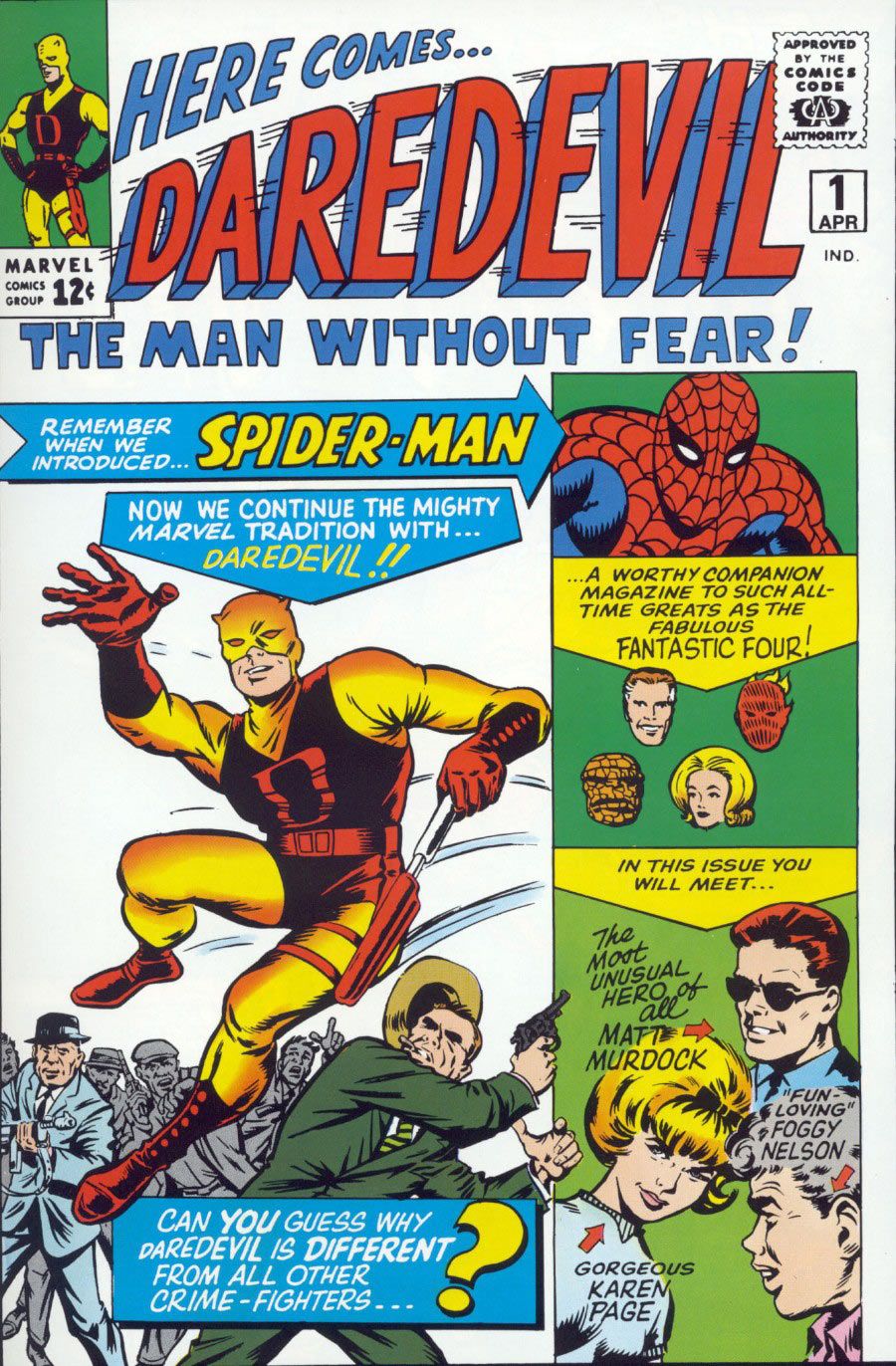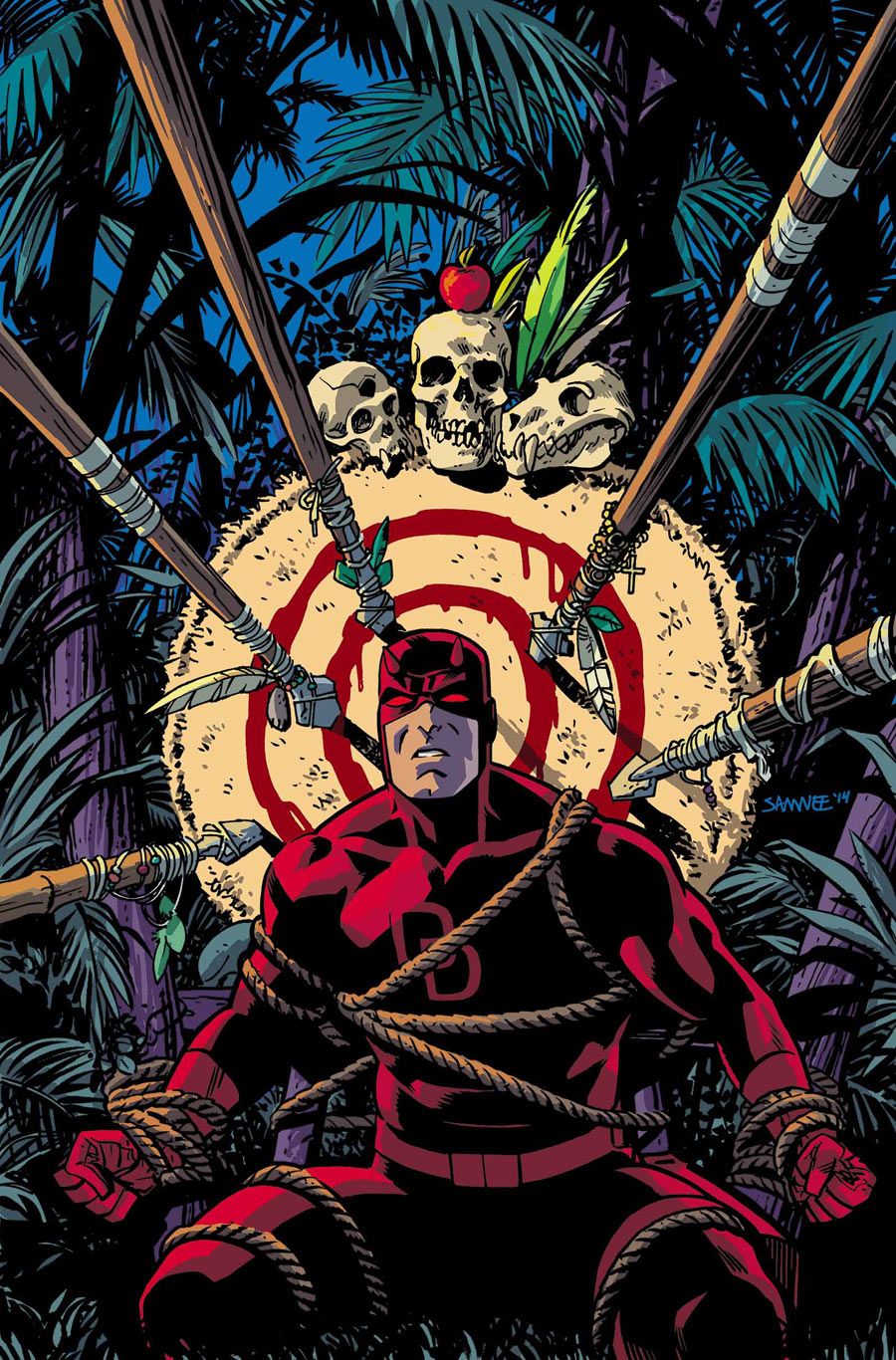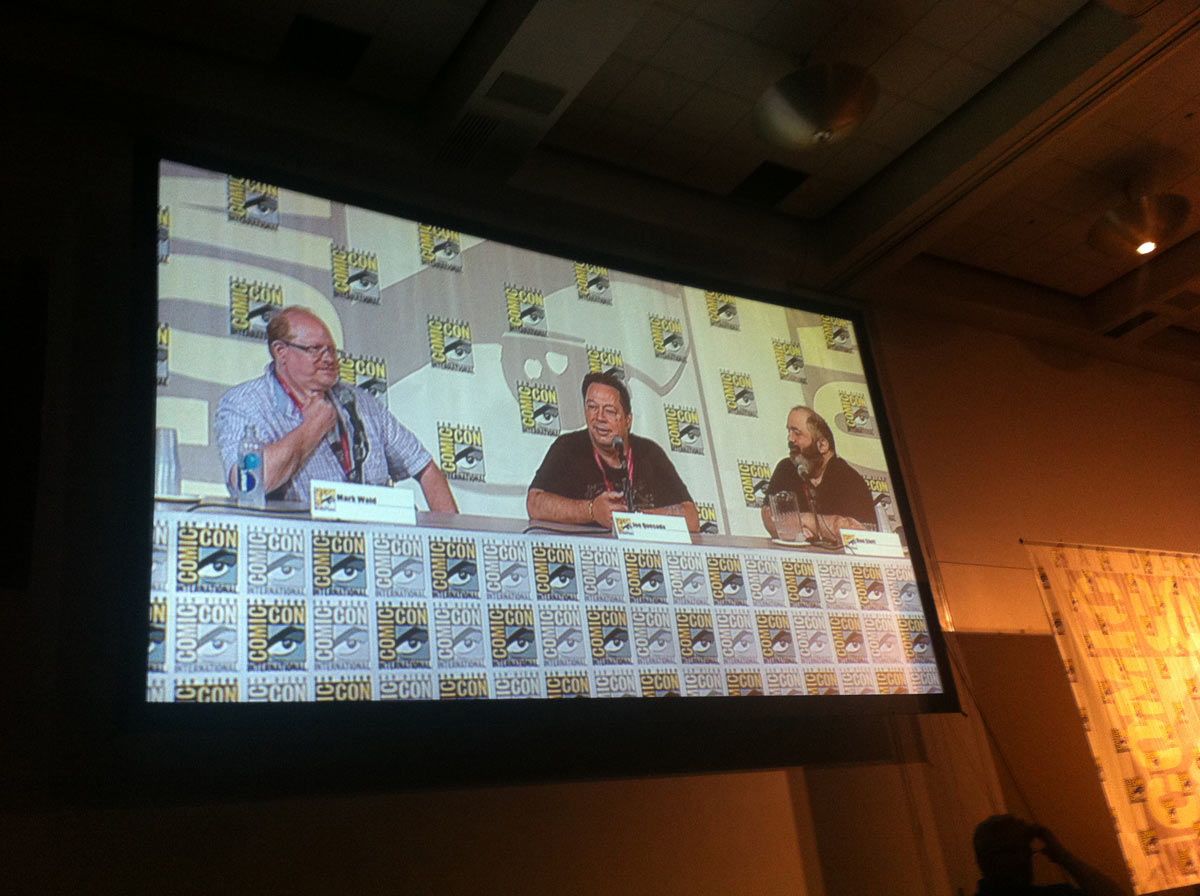Marvel chief creative officer Joe Quesada, "Daredevil" writer Mark Waid and "Amazing Spider-Man" writer Dan Slott discussed some big anniversaries Sunday at Comic-Con International, in the "Marvel Comics' 75th and Daredevil's 50th" panel.
Waid started, appropriately enough, with the origins of Marvel, telling the story of Martin Goodman, and how he was inspired to publish "Marvel Comics" #1 in 1939 following the success of "Action Comics" #1. Waid told the crowd how Stan Lee worked for Goodman as an editor, and they published comics in many different genres after superheroes fell out of fashion. "Is it fair to say Goodman was an advantageous publisher?" Quesada asked.
Relaying that Lee was getting burnt out in the comic book business, Waid said that Lee's wife Joanie advised him, "If you're gonna quit comics and go away and do something else, at least take one last shot and do something you really want to do. Forget what Martin Goodman wants. Forget what you think the fans want. Do something that is personal to you." Along with Jack Kirby, that comic became "Fantastic Four."
Waid asked his fellow panelists when they first became aware of Marvel Comics. Quesada shared it was the anti-drug, non-Comics Code approved issues of "Amazing Spider-Man," #96-#98. "I never did drugs, but I got addicted to comics," Quesada said. "Which may have cost me more money in the long run."
Quesada said he liked how Marvel Comics were diverse, and how Peter Parker lived in the Forest Hills neighborhood of Queens, which was close to where he lived in Jackson Heights. He also enjoyed how the "Stan's Soapbox" column gave readers a view inside the inner-workings of Marvel -- even when things weren't going the way the publisher wanted.
"The day that Jack Kirby left Marvel, I remember reading that Soapbox," Quesada said, which is something many companies may simply ignore, rather than addressing, due to the potential PR nightmare. "He just handled it. Even at that young age, I got it. I got exactly what he was getting at."
Slott said he liked Marvel Comics as a young age because sometimes the heroes lost, citing the fight between Daredevil and Namor in "Daredevil" #7.
Quesada elaborated on his thoughts that the major DC Comics heroes tend to be secret identity first -- Superman and Batman are the real identities, Clark Kent and Bruce Wayne are the masks -- but that's not the case at Marvel. "Stan switched it around. He made Peter Parker and Matt Murdock the real person, and then when they put on the mask, that becomes the facade. It's so much easier for us to relate to those things."
Turning to Daredevil specifically, Waid discussed the work of artist Bill Everett, who co-created the character with Stan Lee. Waid said that unlike a lot of early depictions of Marvel characters, Daredevil debuted rather fully formed -- except for the original yellow-and-black costume.
"The color scheme was tough," Quesada said. "It was a little court jester-ish. It wasn't the kind of thing where it really caught the eye." Wally Wood designed the iconic red costume, which Waid praised for being so enduring, as the costume has rarely changed in the following years.
Waid asked Quesada about his work on "Daredevil" during the Marvel Knights era in the late '90s. "I've always loved the character," Quesada said. "Something about him resonated to me. Him and Spider-Man were my two favorites. As I grew older, [Daredevil] became much more my favorite. there's something beautifully heroic and tragic about the character, and the fact that his powers, while they were somewhat super, you could also probably just explain them away with a person who can hone their own human abilities to utter perfection, if you really wanted to explain them that way. Something about that I really gravitated towards."
Quesada praised the creators who have worked on "Daredevil," over the years, including Stan Lee, Frank Miller, Kevin Smith -- who Quesada said has meant a significant amount to the comic book industry -- Brian Michael Bendis, Alex Maleev, David Mack and Ed Brubaker.
Waid called it a "murderer's row of talent," though he joked, "I've killed that now." Waid praised the work of series artist Chris Samnee. "They're going to have to pull that book out of our cold dead hands at this point."
Talk then turned to the upcoming "Daredevil" Netflix TV series. "The cast is phenomenal, it's got the feel and grit of Hell's Kitchen," Quesada said. "I think everyone's really going to love it. I think the same is going to be true of all the Netflix shows that we're going to be producing, but "Daredevil' is the beginning."
"This is not showmanship," Waid added. "If Joe said it's really good, I believe it's really good."
Waid asked Slott what he likes about Daredevil. "He's one of the most messed-up Marvel characters," Slott said, dating back to his origin. "Everything about him is really messed-up. Everyone is selling [Waid's] 'Daredevil' as the happy Daredevil -- you mess him up, too!"
Discussing Daredevil's powers, Waid said he enjoys how technology has made things more of a challenge for the character -- while he can read printed words with his heightened sense of touch, he's not able to decipher words on a screen.
Turning to fan Q&A, a fan asked what the panel thinks about how movies and TV have affected Marvel. Both Waid and Slott praised the ability of those projects to bring people into comics -- Slott said he meets a lot of female fans who came to the medium through the '90s "X-Men" cartoon.
Waid said that as successful as the other media ventures are, but stated, "When they bring us in three or four times a year to talk about what we're going to do [at Marvel's regular publishing retreats], at no time does anybody say to us, 'You've got to be more like the movie.'" Waid complimented Quesada specifically for that being the case, and realizing that the comics drive everything else.
Next person up asked how the panel would react if they met Steve Ditko. "I met Steve Ditko!" Slott exclaimed, telling the crowd it was while he was working a job in the Marvel office, and Ditko came in to pick up "Squirrel Art" -- and Slott is still visibly excited about the encounter.
A fan asked whether Luke Cage and Iron Fist will be partners in the Netflix series. Quesada said it's too early to talk specifics, but the plan is still to lead to a multi-characters "Defenders" series.
An audience member asked if "Original Sin" was in continuity, which was answered quickly (it is), but led to Waid asking Quesada what he liked about the story. "It was the simplicity of it," Quesada answered. "Sometimes when these things get too complicated, you start losing the thread, and it just becomes unwieldy." Both Slott and Waid said that Quesada seemed especially enthused by "Original Sin." "This is something everybody's really passionate about, and it's been building for some time," Slott added.
"Every character has their time," Quesada told a fan specifically asking about Mephisto. "We have a little movie coming out called 'Guardians of the Galaxy.'" Quesada also pointed out that "Blade" started Marvel's movie momentum back in 1998, a character that has never been one of the company's most prominent heroes. Waid cited the fact that "Hulk" was originally cancelled after six issues, before coming back around and catching on.
The next person up the microphone asked since Marvel Studios has been so successful, if they could do "any" movie and have a hit, naming a theoretical "Squirrel Girl" movie. Quesada a lot of planning and consideration goes into developing the films, so it would be "arrogant" to say that they could do any movie; it's about finding the right characters to bring to screen.
A fan asked if Slott had any plans to write something of a follow-up to J. Michael Straczynski and John Romita Jr.'s "Amazing Spider-Man" #36, which took place directly after the Sept. 11 attacks, given that One World Trade Center is set to open soon. Slott praised the legacy of that story, and said it was voted to be included in the "75th Anniversary" omnibus. "I'd be really scared of doing it wrong," Slott said, since he's not sure he's the right writer for it. "But that's a very good idea."
When asked about the legacy of Jim Steranko, Waid said that he couldn't think of anyone in comics that was "more influential with a smaller body of work," as the artist has illustrated a relatively small number of comics. Quesada said that Steranko, like Stan Lee, is someone who lives up to the legend in person.
The final question asked if Marvel was looking to deliberately combat people's expectations with the "Daredevil" Netflix series, given the negative reception to the 2003 live-action film. Quesada quickly pointed out that Marvel didn't make that movie, and said, "this is our take on it. Marvel's making Daredevil. That's the only way we're looking at it."




